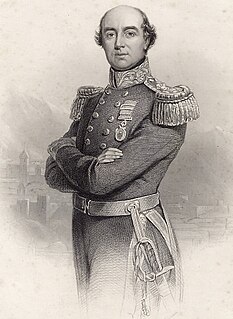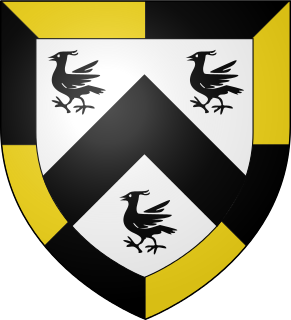
Marquess of Ripon, in the County of York was a title in the Peerage of the United Kingdom. It was created in 1871 for the Liberal politician George Robinson, 2nd Earl of Ripon.
There have been two baronetcies created for persons with the surname Colquhoun ("Cohoon"), one in the Baronetage of Nova Scotia (1625) and one in the Baronetage of Great Britain (1786).
There have been five baronetcies created for persons with the surname Clarke, two in the Baronetage of England and three in the Baronetage of the United Kingdom. Two of the creations are extant as of 2010.
The Egerton, laterGrey Egerton, later stillEgerton baronetcy, of Egerton and Oulton in the county of Chester, is a title in the Baronetage of England held by the senior patrilineal branch of the Egerton family.
There have been two baronetcies created for persons with the surname Alston, both in the Baronetage of England. Both creations are extinct.

There have been twenty baronetcies created for persons with the surname Williams, eight in the Baronetage of England, three in the Baronetage of Great Britain and nine in the Baronetage of the United Kingdom. Only five of the creations are extant as of 2017..

There have been seven baronetcies created for persons with the surname Russell, three in the Baronetage of England and four in the Baronetage of the United Kingdom.

There have been two baronetcies created for members of the Burgoyne family, one in the Baronetage of England and one in the Baronetage of the United Kingdom. Both creations are extinct.
There have been four baronetcies created for persons with the surname Musgrave, one in the Baronetage of England, one in the Baronetage of Nova Scotia, one in the Baronetage of Ireland and one in the Baronetage of the United Kingdom. As of 2014 two of the creations are extant.
There have been two baronetcies created for persons with the surname Mackworth, one in the Baronetage of England and one in the Baronetage of Great Britain. One creation is extant as of 2008.
Wootton House is a late 17th-century country house in Wootton, Bedfordshire, England. It is a Grade II* listed building.
The Gostwick Baronetcy, of Willington in the County of Bedford, was a title in the Baronetage of England. It was created on 25 November 1611 for William Gostwick, High Sheriff of Bedfordshire from 1595 to 1596. The fourth Baronet was Member of Parliament for Bedfordshire. The title became either extinct or dormant on the death of the fifth Baronet in 1766.
The Payne Baronetcy, of St Christopher's in the West Indies, was a title in the Baronetage of Great Britain. It was created on 31 October 1737 for Charles Payne. According to some sources that title became extinct on the death of the second Baronet, Sir Gillis Payne, in 1801. Sir Gillis was in a relationship with a farmer's daughter, Maria Keeling. They apparently married in 1761 although several children had been born before this date. Peter Payne was the eldest son born after the marriage and would normally have succeeded in the title. However, he allowed his eldest brother John Payne to assume the title, although John was illegitimate. John died in 1803 when his son Charles assumed the title. However, in 1828 Peter Payne raised the question in the courts over who was the rightful baronet. The Court of Chancery declared that he was the rightful heir to his father, but this was overturned by the Lord Chancellor in 1829. Nonetheless, during his lifetime Sir Peter was universally acknowledged as a baronet. Most reference books on the British nobility and baronetage include the title, although they describe it as being in dispute between rival branches of the family. Charles Robert Salusbury Payne, the supposed sixth Baronet, appears to have discontinued the claim around 1900.
The Winch Baronetcy, of Hawnes in the County of Bedford, was a title in the Baronetage of England. It was created on 9 June 1660 for Humphrey Winch, subsequently Member of Parliament for Bedford, Bedfordshire and Great Marlow and a Lord Commissioner of the Admiralty. He was the grandson and namesake of Sir Humphrey Winch. Winch had no sons and the title became extinct on his death in 1703, although it was erroneously assumed by his nephew, Humphrey Winch, of Branston, Lincolnshire.
Sir Humphrey Winch, 1st Baronet was an English politician who sat in the House of Commons between 1660 and 1689.
There have been two baronetcies created for persons with the surname Briggs, one in the Baronetage of England and one in the Baronetage of the United Kingdom. Both creations are extinct.
Sir John Cope, 6th Baronet (1673–1749), of Bramshill, Hampshire, was a British banker and Whig politician who sat in the English and British House of Commons for 36 years from 1705 to 1741. He was a Director of the Bank of England from 1706 to 1721.
Sir Monoux Cope, 7th Baronet was a British politician who sat in the House of Commons between 1722 and 1747.
Sir Boteler Chernock, 4th Baronet (1696–1756) of Holcot, Bedfordshire, was a British Tory politician who sat in the House of Commons from 1740 to 1747.
Sir Humphrey Monoux, 4th Baronet of Wootton House, Bedfordshire, was a British landowner and Tory politician who sat in the House of Commons from 1728 to 1741




